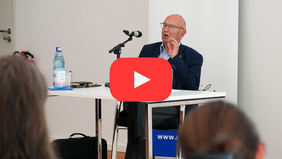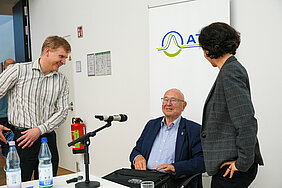The Leibniz Institute for Agricultural Engineering and Bioeconomy (ATB) had the honour of welcoming Dr Christian Patermann, one of the founding fathers of the European bioeconomy, for a colloquium in Potsdam. Within his presentation he shed light on the recent global developments in the broader field of bioeconomy and gave valuable perspectives and potential opportunities for the future of ATB.
Circular bioeconomy is an essential element for the transition into a sustainable and future-proof economy. Dr Christian Patermann is credited with being one of the most important European pioneers whose work had a substantial influence on the modern shape and form of bioeconomy. Following his retirement from the EU Commission back in 2007, he kept on being a driving force within the field, being – among other things – one of the founding members of the first German bioeconomy council.
In his presentation titled “Recent developments in the bioeconomy in Europe and the world – perspectives for the ATB in times of polycrises” last week, Dr Patermann presented significant developments and visions. He emphasised that bioeconomy remains a high priority, even in face of global uncertainties and general conflicts as shown via initiatives by the EU commissions such as “Building the Future with Nature”. He further considered the scaling of processes, the development of new financial- and support- instruments, deregulation in order to minimise risks and the integration of AI and general digitisation to be among the new internationals priorities.
Professor Barbara Sturm, Scientific Director at ATB, showed herself impressed: “We are very grateful for Dr Patermann's visit and his inspiring impressions. His perspective is of great value to us and a wonderful validation of our work here. I'm especially pleased to see that the future paths he laid out correlate with the path we at ATB have already taken, especially with regard to our planned great strategic expansion. He has strengthened our resolve to stick us to our current course and to further position bioeconomy as the potential answer to societal difficulties and challenges.”
Bioeconomy is – according to Dr Patermann – the most complex and research-intensive economical system. Professional communication, narratives, and well-chosen examples are supposed to be necessary to convince the general society of the need for a bioeconomical system. To this end, ATB's scientific researchers have for long been working systematically. The working group “Innovations in Sociotechnical Systems” led by Dr Philipp Grundmann, focuses particularly on interactions between ecological and social systems and how those can be altered to adhere more closely to bioeconomical concepts. This process is conducted in collaboration with relevant actors from politics, science, and more practical fields. The planned expansion will bring this systematic approach practised at ATB to a new level.
Dr Patermann has advised ATB by providing detailed instructions: He commended the course taken so far, but he also advised ATB to focus on strengthening cooperation in areas such as livestock farming and paludiculture as well as to focus on building infrastructure for the biorefineries. He thus ensured ATB about it's strategic positioning in the Leibniz Research Alliance INFECTIONS, the Leibniz Lab Pandemic Preparedness and in global organisations such as FAO, within which Professor Barbara Amon (researcher at ATB) acts as co-chair of the Technical Advisory Group on Circular Bioeconomy in Livestock Supply Chains. He likewise underlined our endeavours to create new recycling networks and to allow for the paludicultural biomass via the rewetting of wetlands. The establishment of the new biorefinerie infrastructure at the Leibniz Innovation Farm for Sustainable Bioeconomy (InnoHof) as well as the advancement of our concept for smart, integrated biorefineries, symbolise significant advancements towards establishing a sustainable bioeconomy.
You can watch the presentation on YouTube in full length.
The colloquium took place on the 23rd of July 2025 at ATB, Potsdam. Following the 45 minute long presentation held in English, all attendants had the opportunity to voice their questions and to engage with Dr Patermann in an open exchange.


